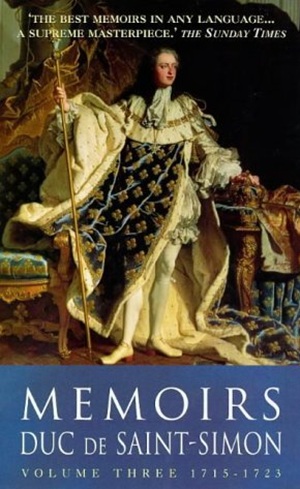Feb 03, 2026
Feb 03, 2026
Memoirs by Saint Simon.
Louis de Rouvroy, who was the Duke of Saint-Simon, wrote his Memoirs between1739 and 1750, around the time Voltaire wrote The Age of Louis XIV. Written in the early 18th century but not published until long after Saint Simon’s death, these memoirs provide one of the most important first-hand accounts of life at Versailles.
 The Memoirs is one of the most remarkable writing achievements in history. One man, with no specific reader in mind, wrote thousands of pages—recording the past for future generations. He brings back to life both personal and shared memories in a unique way. The book is like a fascinating puzzle made up of many types of writing—historical stories, personal life accounts, discussions on court manners, family trees, detailed character descriptions, and vivid scenes recalled from memory or imagination. The writing style is full of energy and emotion. This work is like a whole world by itself. The indexes alone stretch over hundreds of pages, listing thousands of people—ranging from ordinary to extraordinary, and from humorous to serious. He is not afraid of bringing out the scandalous affairs in the court of Versailles.
The Memoirs is one of the most remarkable writing achievements in history. One man, with no specific reader in mind, wrote thousands of pages—recording the past for future generations. He brings back to life both personal and shared memories in a unique way. The book is like a fascinating puzzle made up of many types of writing—historical stories, personal life accounts, discussions on court manners, family trees, detailed character descriptions, and vivid scenes recalled from memory or imagination. The writing style is full of energy and emotion. This work is like a whole world by itself. The indexes alone stretch over hundreds of pages, listing thousands of people—ranging from ordinary to extraordinary, and from humorous to serious. He is not afraid of bringing out the scandalous affairs in the court of Versailles.
Saint-Simon is often linked with the time of Louis XIV, just like Racine or La Fontaine. But when he starts writing his main work, books like The Persian Letters had already been out for 18 years. By the time he finishes, Rousseau is getting ready to write his first major speech—an unusual situation for someone seen as a 17th-century writer. Saint-Simon often refers to events of his own time. He even mentions Voltaire twice, though in a critical way, and he personally knew Montesquieu and was on friendly terms with him. So even though his writing may feel old-fashioned, it shows he was fully aware of the Enlightenment. If his work doesn’t match the spirit of the time, it’s because he strongly rejected the changes happening around him. Saint-Simon’s writing is full of strong emotions—negative, angry, passionate, but also tender and complicated. He was a strong opponent of absolute monarchy and hated how the nobility was treated. Yet, at the same time, he lived close to the king for many years, always hoping for attention or a kind word from him. Because of this, Saint-Simon had mixed feelings about Louis XIV. He admired him in some ways but also deeply criticized him. Surprisingly, this personal and emotional point of view doesn’t hide the truth—it actually gives one of the most honest and realistic pictures of the king.
As a high-ranking nobleman, he resented Louis XIV’s centralization of power, which diminished the aristocracy’s traditional influence. His writing serves both as a personal vindication and a critique of absolutism. Unlike official court historians, Saint-Simon offers unfiltered opinions, exposing the pettiness, vanity, and corruption behind Versailles’ glittering façade. For example, some petty gestures such as nobles competing for trivial honors (like the right to hand the king his shirt) while real power rested with bureaucrats and mistresses. He cuts up personalities with psychological accuracy, from the scheming Madame de Maintenon to the arrogant Duke of Noailles. His disregard for hypocrisy and sycophancy makes the Memoirs a sarcastic social satire.
Saint-Simon’s writing is full of emotion, rich details, and side stories. He writes like someone keeping a diary but also analyzes like a historian. Later French writers, like Marcel Proust, were inspired by how he showed social class differences. Though some say he was biased or not always accurate, his work is valuable because it honestly shows how a nobleman felt about power.
Saint-Simon doesn’t just share gossip—he also shows sadness about the fall of the nobility. He admired the old system where nobles helped govern, unlike the strong control of Louis XIV. His stories about political events, like arguments over who should rule during the Regency, show his worries about France’s future. Interestingly, even though he hated absolute monarchy, his Memoirs became a key source to understand it.
At first, Saint-Simon’s Memoirs were banned because they were too bold. But today, they are seen as an important work of French literature and history. They don’t just tell us about the past—they help us think about power, ambition, and human nature. His stories remind us that history is made up of real people with complex lives.
To conclude, Saint-Simon’s Memoirs are one of the most important records of political life in history. With sharp insights, strong opinions, and literary skill, they go beyond their time. They help readers understand the truth behind the grand image of Louis XIV’s rule and why social power is often unstable.
07-Jun-2025
More by : Dr. Satish Bendigiri